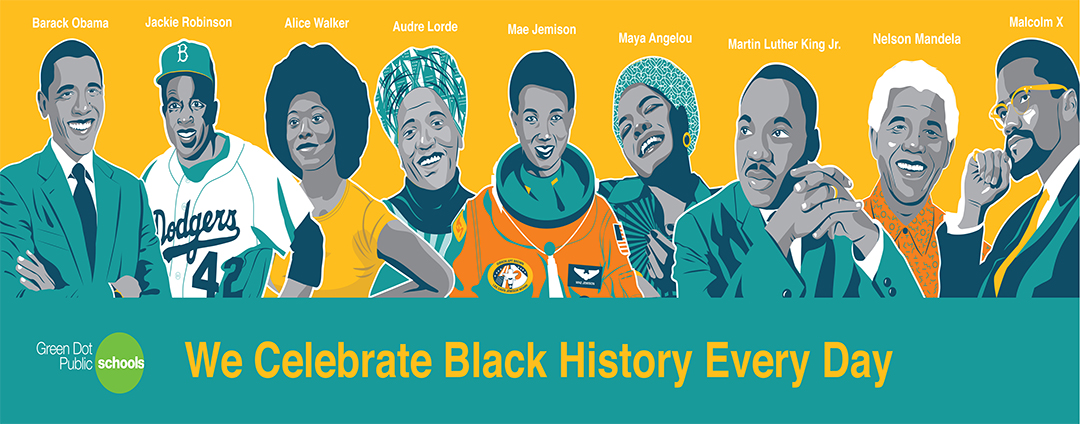I Am Black History: Why and How We Must Contribute to the Pages of All Our Students’ Stories

By: Simyona Bryant,
English teacher at Ánimo Westside Charter Middle School
As I think about Black History Month, I remember a drawing of this little brown lady with long, black hair. It was hand drawn by one of my students and it read: “The first day I walked into this [room], I saw a young brown skinned woman. I knew right away I was going to like this class.” While I don’t believe that looking like your students is a prerequisite to connecting with them , this student connected with me not only because I looked like her, but also because I represent the triumph of many wars fought for a seat at the table. I represent victory for battles fought for a position at the head of a classroom where my students come from different backgrounds. For my students, I am not only black history, I am the black present and future.
I am a teacher and a storyteller, and I reflect on the chapters that my students are writing each day. They all have different stories to tell–some with tragedy and some with triumph. And for this reason, it is important to remind them of the many battles won by people of color who were once unable to fight. In my class, I embrace the study of black world writers, authors, and great literary influencers of different backgrounds. Studying culture and history is a personal journey for my students that not only focuses on academia, but also impresses upon them new ideas and inspires them to become more tolerant and appreciative of the multi-cultural diasporas which have greatly influenced world views and other cultural development.
I Am Black History
I am an African American female educator and I take a proactive role in reshaping my curriculum. Education should transcend beyond the pages of the text and I want every student to be able to reference a literary icon or influence that mirrors them in some way. I believe it will push them to embrace English and literature and allow them to relate to the authors whose stories mimic their own personal background, experience, and achievements. That’s why I share the stories of African American heroes–so that they may learn about a history that has silenced a people who can now read, write, and share those stories. I want my students to have knowledge of African American, Hispanic, Asian, and other minority writers.
I am privileged to be entrusted with such moldable beings and have taken this service with great humility and responsibility. The bonds I have created with each of my students are both sacred and purposeful. They trust me with their history, haikus of questioned identities, and ballads of distress that outline the difficulties of what it is like to be a ‘victim’ of middle school. When it comes to my commitment to my students and their ability to read both the pages in their textbooks and the implicit meanings behind each word in their own stories, I will remain tireless.
I share Barack Obama’s sentiment that recalled, “My mother taught me empathy- the basic concept of standing in somebody else’s shoes and looking through their eyes. If I did something messed up, she’d say, “How would that make you feel if somebody did that to you? If we see a child who’s languishing in an inner-city school, how would we feel if that was our child?” When I consider these questions, I double down on my commitment to culturally responsive pedagogy –it is my duty to embrace and understand the history of all Americans, especially those who have overcome great trials to embrace great achievement.
Benjamin Franklin challenged us when he insisted, “Tell me and I forget. Teach me and I remember. involve me and I learn.” When we involve our students in their own learning and interweave their stories in those of black thought leaders, inventors, and world changers, we give them opportunities to understand the struggle of people who have persevered. This understanding of their struggle helps our students to fight for their own with vigor and determination. As educators, we must contribute to the pages of their stories by momentous and extraordinary means. For these are students who will one day lead great nations, head productive households, and service great communities.
